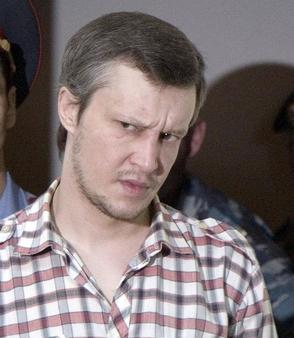Alexander Pichushkin
Alexander Pichushkin (April 9, 1974 – ) is a Russian serial killer known as the "Chessboard Killer" and the "Bitsa Park Maniac." Pichushkin committed most of his murders in Bitsa Park, located in the southwest of Moscow. He was convicted on October 24, 2007, for the murder of 48 people, although he claimed to have killed 60, with the goal of filling all 64 squares of a chess board.
Early Life[edit | edit source]
Alexander Pichushkin was born in Mytishchi, a suburb of Moscow, into a working-class family. From an early age, he exhibited signs of aggressive behavior and difficulties in social integration. His grandfather recognized his potential and intelligence, taking him under his wing and introducing him to the game of chess. Pichushkin excelled in chess, finding solace and a sense of accomplishment in the game. However, his grandfather's death profoundly affected him, leading to a significant change in his behavior and the beginning of his violent tendencies.
Crimes[edit | edit source]
Pichushkin's murders began in 1992 and continued until his arrest in 2006. His method of killing his victims involved luring them to Bitsa Park with the promise of drinking vodka together to mourn the death of his dog or to celebrate a personal achievement. Once in a secluded area of the park, he would attack his victims, often hitting them on the head with a hammer. He would then insert a broken bottle into the skull of some of his victims. Pichushkin targeted primarily elderly homeless men, but his victims also included younger men, women, and children, showing no particular preference for age or gender.
Arrest and Conviction[edit | edit source]
Alexander Pichushkin was arrested on June 16, 2006, after a murder victim's personal belongings were traced back to him. During the investigation, he was charged with 49 murders and attempted murders. Pichushkin proudly confessed to 63 murders, expressing disappointment at not completing his goal of 64. On October 24, 2007, he was sentenced to life imprisonment, with the first 15 years to be spent in solitary confinement.
Psychological Profile[edit | edit source]
Experts have attempted to understand Pichushkin's motives, with some suggesting that he was driven by a need to dominate and control his victims, seeing each murder as a victory akin to winning a game of chess. Others believe that the death of his grandfather played a crucial role in his psychological development, leading him to seek revenge against society for his loss.
Impact[edit | edit source]
The case of Alexander Pichushkin has had a significant impact on Russian society and its perception of serial killers. It has raised questions about the effectiveness of law enforcement in preventing such crimes and the need for improved mental health support systems.
In Popular Culture[edit | edit source]
Pichushkin's crimes have been the subject of various documentaries and true crime shows, reflecting the public's fascination with his case and the broader issues of serial murder and criminal psychology.
 This biography of a person notable in the field of crime or criminal justice is a stub. You can help WikiMD by expanding it.
This biography of a person notable in the field of crime or criminal justice is a stub. You can help WikiMD by expanding it.
Transform your life with W8MD's budget GLP1 injections from $125 and up biweekly
W8MD offers a medical weight loss program NYC and a clinic to lose weight in Philadelphia. Our W8MD's physician supervised medical weight loss centers in NYC provides expert medical guidance, and offers telemedicine options for convenience.
Why choose W8MD?
- Comprehensive care with FDA-approved weight loss medications including:
- loss injections in NYC both generic and brand names:
- weight loss medications including Phentermine, Qsymia, Contrave, Diethylpropion etc.
- Accept most insurances for visits or discounted self pay cost.
- Generic weight loss injections starting from just $125.00 for the starting dose
- In person weight loss NYC and telemedicine medical weight loss options in New York city available
Book Your Appointment
Start your NYC weight loss journey today at our NYC medical weight loss, and Philadelphia and visit Philadelphia medical weight loss Call (718)946-5500 for NY and 215 676 2334 for PA
Search WikiMD
Ad.Tired of being Overweight? Try W8MD's NYC physician weight loss.
Semaglutide (Ozempic / Wegovy and Tirzepatide (Mounjaro / Zepbound) available. Call 718 946 5500.
Advertise on WikiMD
|
WikiMD's Wellness Encyclopedia |
| Let Food Be Thy Medicine Medicine Thy Food - Hippocrates |
Translate this page: - East Asian
中文,
日本,
한국어,
South Asian
हिन्दी,
தமிழ்,
తెలుగు,
Urdu,
ಕನ್ನಡ,
Southeast Asian
Indonesian,
Vietnamese,
Thai,
မြန်မာဘာသာ,
বাংলা
European
español,
Deutsch,
français,
Greek,
português do Brasil,
polski,
română,
русский,
Nederlands,
norsk,
svenska,
suomi,
Italian
Middle Eastern & African
عربى,
Turkish,
Persian,
Hebrew,
Afrikaans,
isiZulu,
Kiswahili,
Other
Bulgarian,
Hungarian,
Czech,
Swedish,
മലയാളം,
मराठी,
ਪੰਜਾਬੀ,
ગુજરાતી,
Portuguese,
Ukrainian
Medical Disclaimer: WikiMD is not a substitute for professional medical advice. The information on WikiMD is provided as an information resource only, may be incorrect, outdated or misleading, and is not to be used or relied on for any diagnostic or treatment purposes. Please consult your health care provider before making any healthcare decisions or for guidance about a specific medical condition. WikiMD expressly disclaims responsibility, and shall have no liability, for any damages, loss, injury, or liability whatsoever suffered as a result of your reliance on the information contained in this site. By visiting this site you agree to the foregoing terms and conditions, which may from time to time be changed or supplemented by WikiMD. If you do not agree to the foregoing terms and conditions, you should not enter or use this site. See full disclaimer.
Credits:Most images are courtesy of Wikimedia commons, and templates, categories Wikipedia, licensed under CC BY SA or similar.
Contributors: Prab R. Tumpati, MD



